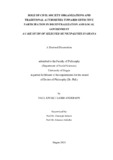Citation link:
http://dx.doi.org/10.25819/ubsi/9987| DC Field | Value | Language |
|---|---|---|
| dc.contributor.author | Anderson, Paul Kwaku Larbi | - |
| dc.date.accessioned | 2021-09-09T13:00:46Z | - |
| dc.date.available | 2021-09-09T13:00:46Z | - |
| dc.date.issued | 2021 | de |
| dc.description.abstract | In recent years, several sub-Saharan African countries have implemented a robust decentralization policy towards governance reformation to enhance civic participation in the decision-making process. Against the background, this study examines civil society organizations and traditional authorities’ role toward effective participation in Ghana’s decentralization and local government policy. The assumption is that traditional authorities and civil society organizations’ legitimacy enable them to play a crucial role in the governance and development discourse. Accordingly, a participatory approach was adopted within a qualitative methodological framework, which informed the case study as the research design type. Data was obtained through a semi-structured interview, non-participant observation, focused group discussions, documents, and material culture analysis. Respondents were purposefully selected from Metropolitan Municipal District Assemblies (MMDAs), Community-based Civil Society Organizations (CSOs), and Traditional Authorities from three selected municipalities in Ghana: Nsawam/Adoagyiri, Suhum, and Cape Coast. This study reveals that in addition to the conventional role of civil society organizations and traditional authorities in service areas such as health, education, advocacy, and general community development, they also perform an exceptional function in local governance as an impartial force in providing checks and balances and support on local government functionaries. Thus, their involvement in local government administration in the decision-making and implementation process is vital in enhancing accelerated national development. | en |
| dc.identifier.doi | http://dx.doi.org/10.25819/ubsi/9987 | - |
| dc.identifier.uri | https://dspace.ub.uni-siegen.de/handle/ubsi/1973 | - |
| dc.identifier.urn | urn:nbn:de:hbz:467-19735 | - |
| dc.language.iso | en | de |
| dc.rights | Attribution-NoDerivatives 4.0 International | * |
| dc.rights.uri | http://creativecommons.org/licenses/by-nd/4.0/ | * |
| dc.subject.ddc | 300 Sozialwissenschaften | de |
| dc.subject.other | Ghana | en |
| dc.subject.other | Local government | en |
| dc.subject.other | Traditional authority | en |
| dc.subject.other | Participation | en |
| dc.subject.other | CSOs | en |
| dc.subject.other | Decentralization | de |
| dc.subject.swb | Ghana | de |
| dc.subject.swb | Dezentralisation | de |
| dc.subject.swb | Kommunalpolitik | de |
| dc.subject.swb | Zivilgesellschaft | de |
| dc.subject.swb | Politische Beteiligung | de |
| dc.title | Role of civil society organizations and traditional authorities towards effective participation in decentralization and local government | en |
| dc.title.alternative | Die Rolle zivilgesellschaftlicher Organisationen und traditioneller Autoritäten im Hinblick auf eine wirksame Beteiligung an der Dezentralisierung und lokalen Verwaltung: Eine Fallstudie über ausgewählte Gemeinden in Ghana | de |
| dc.type | Doctoral Thesis | de |
| item.fulltext | With Fulltext | - |
| ubsi.contributor.referee | Strünck, Christoph | - |
| ubsi.date.accepted | 2021-06-25 | - |
| ubsi.organisation.granting | Universität Siegen | - |
| ubsi.origin.dspace5 | 1 | - |
| ubsi.publication.affiliation | Seminar für Sozialwissenschaften | de |
| ubsi.subject.ghbs | PDGN | de |
| ubsi.subject.ghbs | PBI | de |
| ubsi.subject.ghbs | OYH | de |
| ubsi.title.alternative | a case study of selected municipalities in Ghana | en |
| Appears in Collections: | Hochschulschriften | |
Files in This Item:
| File | Description | Size | Format | |
|---|---|---|---|---|
| Dissertation_Paul Anderson.pdf | 2.6 MB | Adobe PDF |  View/Open |
This item is protected by original copyright |
Page view(s)
720
checked on Nov 25, 2024
Download(s)
810
checked on Nov 25, 2024
Google ScholarTM
Check
Altmetric
This item is licensed under a Creative Commons License


